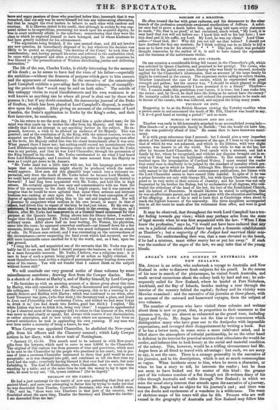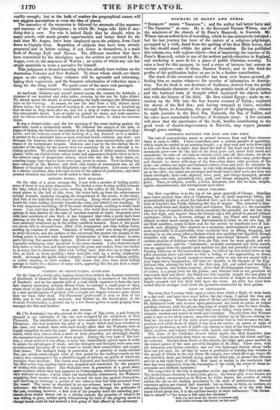ANG AS's LIFE AND SCENES IN AUSTRALIA AND NEW ZEALAND.
Ma. ANGAS is an artist, who undertook a voyage to Australia and New Zealand in order to discover fresh subjects for his pencil. In the course of his tour in search of the picturesque, he visited South Australia, and made several excursions about the colony both by land and sea; he sub- sequently sailed for New Zealand, where he landed at Port Nicholson, Auckland, and the Bay of Islands, besides making a tour through the interior of the country behind the capital ; Sydney and its vicinity were likewise examined : and the narrative of his journies at these places, with an account of the outward and homeward voyages, form the subject of two volumes.
The number of persons who have visited these colonies and written• about them is now so great, that, in proportion to their sameness to the common eye, they are almost as exhausted as the grand tour, including Egypt and Syria. Mr. Angas has not the bias or the coarseness which distinguishes many who have gone out to the Antipodes with impossible expectations, and revenged their disappointment by writing a book. But if he has a better taste, in some sense a more cultivated mind, and is lifted above the atmosphere of colonial partisanship, he on the other hand is deficient in the interest for practical matters that stimulates the would-be settler, and induces him to look keenly at the social and material condition of the colony. This, however, would be a trifling circumstance had Mr. Angas been at all fitted to travel with advantage: but such, we are sorry to say, is not the case. There is a strange generality in the narrative of his journies, and in his descriptions, which is not so much commonplace as vague. When incidents occur to him, when he meets a character, or when he has a story to tell, he interests the reader ; but he does not seem to have looked out for matter of this kind : the greater part of his volumes consists of a flat though not ill-written diary of his rides through Australia and walks through New Zealand ; in which we miss the usual story interest that attends upon the narrative of a journey, because Mr. Angus had no object for his journey's end ; and there was not the doubt and excitement of a wanderer in a wilderness. The want of skeleton-maps of his tours will also be felt. Persons who are well versed in the geography of Australia and New Zealand may follow him
readily enough; but to the bulk of readers the geographical names will not suggest associations or even the idea of places.
The narrative of the excursion is followed by accounts of the manners and customs of the Aborigines ; in which Mr. Angas tells little if any- thing that is new. Nor was it indeed likely that he should, when so many minds with much greater opportunities and better fitted for the task than dr. Angas, have been employed upon the subject, from Cook down to Captain Grey. Repetition of subjects that have been already presented and in better setting, if not better in themselves, is a main fault of Savage Life and Scenes. The different murders that have been committed by the Aborigines upon the settlers are narrated by Mr. Angas, even to the massacre of Wairau ' • an action of which any one has ample materials to write a narrative for himself.
This judgment is formed knowing what has already been written on the Australian Colonies and New Zealand. To those whose minds are blank paper on the subject, these volumes will be agreeable and informing, bating their vagueness, and the frequent substitution of reflection upon a thing for the thing itself. We quote some of the more real passages.
UNSUCCESSFUL COLONISTS: BOOTH AUSTRALIA.
At daybreak. Gisborne and myself started across the country for Adelaide, a distance of one hundred and sixty miles, steering by the sun for Lake Albert. We struck across the desert, to avoid passing the night amongst the Milmendura tribe on the Coorong. At sunset, we saw the lake from a hill, distant about fifteen miles; but we despaired of reaching it, as our horses were so knocked up that we had to drag them after us, and not a drop of water was to be found in this inhospitable desert. Late at night we gained its shore; and both ourselves and our horses rushed into the muddy and brackish water, to slake our extreme thirst.
It was a dismal night; and the low moaning of the ocean lashing against the sand-hills made a melancholy sound. We followed the margin of the lake, in hopes of finding the furthest out-station of the South Australian Company's shep- herds; and the welcome sound of the barking of a dog directed us to a shelter: it proved to be a miserable hut—a most wretched hovel—without any door; and through the doorway the violence of the storm beat most unmercifully upon the repose of its unfortunate tenants. Gisborne and I sat by the fire daring the re- mainder of the night, for the insects were too annoying for us to attempt a re- clining position. We gladly breakfasted upon a piece of filthy mutton, without plates; while our forlorn hosts, whose looks and appearance bespoke them to be in the extreme stage of despondent misery, stood over the fire in their shirts, re- counting happy days that to them were past, never to return. Their bedding had been retained at the Murray; and their only source of amusement was an old History of England and a very dilapidated copy of Sbakspere. Like many others in a similar condition, they had once moved in the sphere of gentlemen; and their present situation was indeed one ill suited to their tastes.
BOILING PONDS: NEW ZEALAND.
On the edge of a great swampy flat, I met with a number of boiling ponds; some of them of very large dimensions. We forded a river flowing swiftly towards the lake, which is fed by the snows melting in the vallies of the Tongariro. In many places in the bed of this river, the water boils up from the subterranean springs beneath, individual who changing the temperature of the steam, to the immi- nent risk of the ndividual who may be crossing. Along whole tracts of ground I beard the water boiling violently beneath the crust over which I was treading. It is very dangerous travelline; for if the crust should break, scalding to death must ensue. I am told that theHoturua Natives, who build their houses over the hot springs in that district for the sake of constant warmth at night, frequently meet with fatal accidents of this kind: it has happened that when a party have been dancing on the floor, the crust has given way, and the convivial assembly have been suddenly swallowed up in the boiling cauldron beneath. Some of the ponds are ninety feet in circumference filled with transparent pale blue boiling water, sending up columns of steam. 'Channels of boiling water run along the ground in.eyery direction, and the surface of this calcareous flat around the margin of the ponds is covered with beautiful incrustations of lime and alum, in some partsforming flat saucer-like figures. Husks of maize, moss, and branches of vegetable substances, were incrusted in the same manner. I also observed small deep holes or wells here and there amongst the grass and rashes, from two inches to as many feet in diameter, filled with boiling mud, that rises up in large bub- bles, as thick as hasty pudding: these mud-pits send up a strong sulphurous smell Although the ponds boiled violently, I noticed small flies walking swiftly, or rather running, on their surface. The aerial that rises from these boiling springs is visible at a distance of many miles, appearing like the jets from a num- ber of steam-engines.
VARIETY OF GRAVE-YARDS, AUCKLAND.
On the slope of a lovely glen, leading inland from behind the Eastern extremity of Auckland, is situated the burial-ground belonging to members of the Church of England; and on the opposite side of a road which separates it from the open fern country extending towards Mount Eden, is enclosed a small piece of land, where those of the Catholic faith may find interment. The Jews also have railed .in a neat parallelogram of ground, with a simple yet elegant entrance-gate, where 'they too bury their dead. The Dissenters' grave-yard is next to that of the Jews, and is but partially. enclosed; and further on, the burial-place of the Scottish Presbyterians is pointed out by a few flower-grown mounds peeping from amongst the fern and heather.
WAR AND TRADE.
He [Te Awaitaia] was also present at the siege of Nga mote, a pah formerly situated at one extremity of the site now occupied by the settlement of New Plymouth. The inhabitants of this pah were assisted in their defence by several Europeans, who had mounted the guns of a vessel which had been wrecked on the coast, and worked them with such deadly effect that the Waikatos were at length compelled to raise the siege. Several incidents occurred during this siege, which, while they almost elicit a smile at their absurdity, yet strikingly display the unsophisticated character of these people. During the very heat of the con- test, a vessel arrived in the offing; a truce was immediately agreed upon in order to secure the advantages of trade, and the besiegers and besieged were soon seen promiscuously hurrying off to the vessel to barter their commodities and supply their wants. The besieged being in possession of a quantity of ready-dressed tax, (an article mach sought after at that period by the trading-vessels on the coast,) they exchanged it for a plentiful supply of tobacco, an article of which the besiegers were destitute. The vessel soon departed, and hostilities recommenced; but altar a few days another truce was proposed and concluded, for the purpose of trading with each other I The Waikatos were in possession of a great many spare muskets which they had captured at Pukerangiora, while the besieged were very deficient in arms: a brisk trade was immediately commenced, the Waikatos supplying their enemies with arms to be turned the next day against themselves, and receiving in exchange a portion of the tobacco that had been procured from the vessel. The scene, as described by an eye-witness, must have been most ludicrous: the Waikato thrust his musket half-way through the palisades of the pah, retaining, however, a firm hold of his property until the intending pur- chaser from within thrust out in a similar manner the quantity of tobacco he was willing to give; neither party relinquishing his hold of the property about to change hands until he had secured a firm grasp of that offered by his adversary.



































 Previous page
Previous page